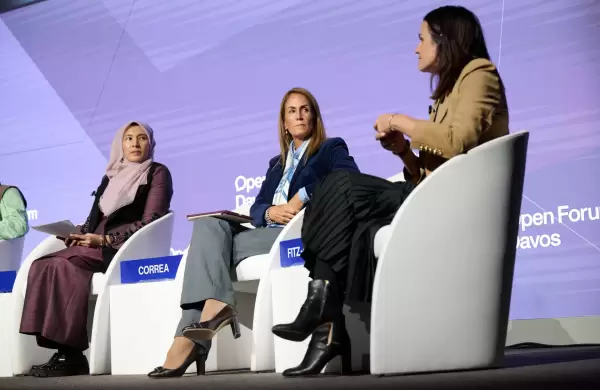Carmen Correa, CEO of Pro Mujer, has been recognized by Forbes in its prestigious “50 Over 50 Global” list. With a career spanning over three decades in the social sector, Correa is a powerful advocate for gender equality in Latin America. At the World Economic Forum, she highlighted the urgent challenges women in the region face and emphasized the need for collective action among public and private institutions to close the gender gap.
A Career Dedicated to Social Impact
Born in Uruguay, Carmen Correa holds a Bachelor’s degree in Business Administration from National Louis University in McLean, Virginia, and a Business Administration Certification from Georgetown University. Her extensive experience in social impact has earned her recognition from Google.org as one of the “Women to Watch.”
As the CEO of Pro Mujer, Correa leads an organization that has transformed thousands of women’s lives by integrating financial inclusion, health services, and training programs. Through her leadership, she is driving meaningful change and pushing for economic and social empowerment across Latin America.
The Gender Gap: An Urgent Challenge
During the World Economic Forum’s panel discussion, Open Forum: Levelling the Playing Field, Correa addressed the pressing issues affecting women in the region. According to the Global Gender Gap Report 2024, gender parity remains 134 years away. Latin America faces particularly severe challenges:
- 24% of women live in poverty.
- Only 47% participate in the labor market.
- 73% of microbusinesses led by women lack access to necessary financing.
To bridge this gap, Correa calls for intersectoral partnerships among governments, private companies, and civil society organizations. She stresses the importance of listening to women’s diverse experiences, particularly those from indigenous, migrant, and disabled communities. Additionally, she highlights the necessity of comprehensive healthcare and gender violence prevention, particularly in vulnerable areas.
“Waiting 134 years is not an option,” she asserts. “We must act immediately, sustainably, and inclusively to ensure a fairer future for all.”
The Economic Impact of Gender Inequality
The gender gap is not just a social issue—it is an economic one. Correa outlines several key barriers:
- Poverty levels and low workforce participation.
- Lack of financing for women-led businesses.
- Cultural norms limiting access to education and healthcare.
When women are excluded from economic opportunities, the entire region suffers. Research shows that businesses led by women in Latin America generate 20% more revenue than those led by men, even though they have access to only half the capital.
Moreover, supporting female entrepreneurs represents a $93 billion opportunity for the region. Correa urges policymakers and investors to recognize that investing in women is not charity—it is a smart economic decision.
Global Commitment to Gender Equality
Reflecting on her experience at the World Economic Forum in Davos, Correa acknowledges the global momentum for gender equality despite setbacks. She notes that while some companies have abandoned diversity and inclusion efforts, many others remain committed to advancing women’s rights.
“I am pleased to see that gender equality is still on the agenda,” Correa says. “Despite global backlash, there is a strong recognition of its importance.”
She emphasizes that young people play a transformative role in shaping the future. Engaging the next generation is essential to sustaining progress and fostering new leadership in gender equality.
Public-Private Partnerships for Women’s Empowerment
Strong alliances between governments, corporations, and nonprofits are crucial to fostering female entrepreneurship. Correa highlights Pro Mujer’s partnership with Google.org as an example of impactful collaboration. Google sought to expand financial inclusion and entrepreneurship opportunities for women in vulnerable regions of Mexico, Argentina, and Guatemala. Through their partnership, thousands of women have gained access to resources and training that enable them to build sustainable businesses.
“Each sector brings its own expertise,” Correa explains. “The key is dialogue and collaboration. We don’t need to reinvent the wheel—we need to build bridges.”
The Future of Pro Mujer: 35 Years of Impact
As Pro Mujer celebrates its 35th anniversary, the organization is adapting to new challenges while staying true to its mission. The digital revolution has transformed how women access financial and educational resources, and Pro Mujer is expanding its online services to reach millennial and Gen Z women who prefer digital solutions.
Despite technological advancements, structural barriers remain. Economic inequality disproportionately affects women, particularly those facing intersectional challenges such as ethnicity, caregiving responsibilities, and informal employment. Many lack financial literacy, access to training, and professional mentorship.
Additionally, 47 million women in Latin America lack access to essential healthcare services, according to the Pan American Health Organization. Improving women’s health remains a top priority for Pro Mujer, as it is the foundation for personal and economic development.
Moving Forward: A Call to Action
Carmen Correa’s message is clear: Investing in women is investing in the future of Latin America. With continued support from public and private stakeholders, progress can be accelerated, ensuring a more inclusive and prosperous society.
“We have enormous potential waiting for an opportunity,” Correa concludes. “Now is the time to act.”

